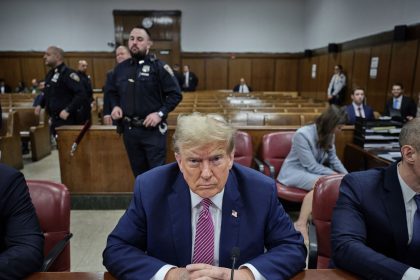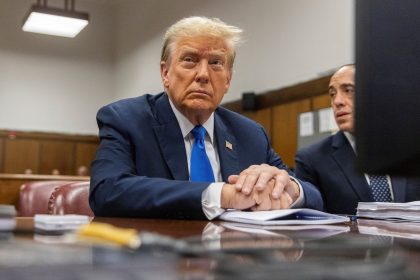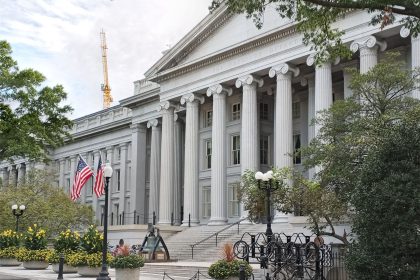What If a State Can’t Agree Which Presidential Candidate Won?

Imagine this scenario: It’s been weeks since Election Day, and in one state, it’s not clear which presidential candidate won.
In an initial count, the Democrat won by roughly 100 votes. Then an audit found a counting error that put the Republican ahead. Officials launch a recount, but it’s not finished by the December deadline for the Electoral College to cast votes. So the state’s Democratic and Republican electors each declare victory and cast competing sets of electoral votes for their candidates.
Outlandish? Not really. This happened in Hawaii in 1960, when John F. Kennedy faced then-Vice President Richard Nixon in a high-turnout election marked nationally by voting irregularities and allegations of fraud.
This year, as millions of Americans mail their ballots or stand in line well before Election Day, Nov. 3, to make sure their votes get counted, few may be aware of the complex legal machinery that exists to select the next president if things go wrong at the ballot box.
It’s a complex system of electoral fail-safes that starts and ends with the calendar. It’s also a system where voters don’t necessarily get the final word, at least not directly.
For the 2020 election, the states have until Dec. 8 — six days before the Electoral College must meet — to count votes and settle all election disputes. If states can’t figure things out by that “safe harbor” day, the newly elected Congress gains the ability to determine the state’s winner when lawmakers meet to count electoral votes on Jan. 6.
These guardrails were erected after the disputed presidential election of 1876, in which multiple states in the Reconstruction South cast competing sets of electoral votes. To sort out the mess, Congress formed a bipartisan commission of representatives, senators and Supreme Court justices, who awarded the votes to popular-vote loser Rutherford B. Hayes. Hayes won the electoral vote 185-184.
Hoping to avoid a repeat, Congress passed the Electoral Count Act of 1887, which gave states the “safe harbor” deadline by which they could resolve their own disputes without Congress getting involved. After that deadline, if state officials submit multiple sets of conflicting electoral votes, the U.S. House and Senate must agree on which set to accept. (If the chambers don’t agree, the votes certified by the state’s governor prevail.)
That’s what happened with Hawaii in 1960, with little fanfare. Congress chose to accept and count a third slate of electoral votes, for Kennedy, submitted by the state’s governor in January. By then, a recount had shown Kennedy won the state’s popular vote. Kennedy, who already had a clear majority of electoral votes from elsewhere, became president.
When it comes to preventing post-election chaos, “the best protection is the timetable,” said Jeffrey Davis, a political science professor at the University of Maryland, Baltimore County. “The president’s term ends on Jan. 20, regardless of what he says and what happens with the election. He cannot get a second term without winning the election or without Congress saying so.”
President Donald Trump has, at various times, claimed baselessly that mail-in ballots are fraudulent, opposed funding for the Postal Service in order to hamper election mail, refused to commit to a peaceful transfer of power, suggested delaying the election, instructed some voters to potentially vote twice, called to “lock up the Bidens,” and suggested the Supreme Court seat he just filled might decide the winner.
“Now, we’re counting on the federal court system to make it so that we can actually have an evening where we know who wins. Not where the votes are going to be counted a week later or two weeks later,” Trump told a crowd in Fayetteville, North Carolina, in September.
Many critics are worried about how Trump might act on election night and immediately afterward; polls show him well behind Democratic nominee Joe Biden.
“It’s very likely that the president will be making claims about the validity or invalidity of the vote counting process as it’s happening,” said Adav Noti, an elections expert at the Campaign Legal Center, a nonpartisan voting advocacy nonprofit. “But the president has no control or authority over that process at all. Literally zero. And so as long as state officials and the courts all abide by their legal obligations, regardless of the rhetoric, the election will be resolved peacefully and in a timely manner.”
Just because there’s a process for legally sorting out electoral problems doesn’t mean that process will go smoothly or uncontroversially. If there’s recount drama, a lot of it is likely to happen before the Dec. 8 safe harbor deadline, before which the states remain in full control of how to pick their own electors.
Consider Florida in 2000, where the race between the Republican, George W. Bush, and the Democrat, Al Gore, was unbelievably close, leading to an infamous recount as Florida’s Republican secretary of state initially certified Bush as the winner.
The race ended after the U.S. Supreme Court handed down a ruling, Bush vs. Gore, on “safe harbor” day, that ended the recount. Part of the court’s logic was that the recount was not sticking to the procedures that existed before Election Day and jeopardized the state’s ability to pick its own winner before Congress took over.
“The court basically argued that if the recount couldn’t be finished by that (safe harbor) date, they would risk disenfranchising Florida’s voters,” Davis said.
The court’s liberal minority disagreed vehemently.
“Although we may never know with complete certainty the identity of the winner of this year’s Presidential election, the identity of the loser is perfectly clear,” Justice John Paul Stevens wrote in a dissent. “It is the Nation’s confidence in the judge as an impartial guardian of the rule of law.”
Congress never got involved. It was obligated to accept the results presented by Florida in favor of Bush because the state met the safe harbor deadline.
In North Carolina, a key 2020 presidential battleground, a state law enacted in 2001 actually spells out how the state would avoid another Bush vs. Gore scenario and ensure that Congress doesn’t meddle with its results.
If there’s no certified winner by safe harbor day, the state’s currently Republican-controlled Legislature picks the electors “in accord with their best judgment of the will of the electorate.” The statute adds that “the judgment itself of what was the will of the electorate is not subject to judicial review.”
In other words: We’ll be picking the electors, thanks.
“As far as we know, there is no other similar law in the country,” Noti said, noting that “it’s never been applied, never been tested.”
A recent Atlantic article quoted an unidentified Trump-campaign legal adviser as saying the campaign was already game-planning scenarios where GOP-held legislatures might move to directly appoint the electors in case of murky voting results: “The state legislatures will say, ‘All right, we’ve been given this constitutional power. We don’t think the results of our own state are accurate, so here’s our slate of electors that we think properly reflect the results of our state.’ ”
The Trump campaign declined to comment on the record.
Biden campaign spokesman Michael Gwin, asked about the scenario raised in the Atlantic article, declined to address it head-on.
“The Biden campaign has assembled the biggest voter protection program in history to ensure the election runs smoothly and to combat any attempt by Donald Trump to create fear and confusion with our voting system, or interfere in the democratic process,” Gwin said in a statement. “We’re confident that we’ll have free and fair elections this November, and that voters will decisively reject Donald Trump’s erratic, divisive and failed leadership at the ballot box.”
But at least how the law is written, only time will really tell.
___
(c)2020 Los Angeles Times
Distributed by Tribune Content Agency, LLC
























